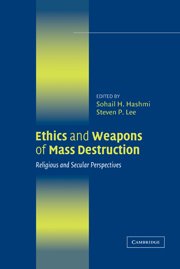Book contents
- Frontmatter
- Contents
- Tables and Figures
- Acknowledgments
- Abbreviations
- Ethics and Weapons of Mass Destruction
- Introduction
- 1 Weapons of Mass Destruction: A Brief Overview
- 2 The International Law Concerning Weapons of Mass Destruction
- PART ONE THE ORIGINAL DEBATE
- PART TWO EXPANDING THE CONVERSATION
- 11 Buddhist Perspectives on Weapons of Mass Destruction
- 12 Buddhism and Weapons of Mass Destruction: An Oxymoron?
- 13 Confucianism and Weapons of Mass Destruction
- 14 “Heaven's Mandate” and the Concept of War in Early Confucianism
- 15 Hinduism and the Ethics of Weapons of Mass Destruction
- 16 Hinduism and Weapons of Mass Destruction: Pacifist, Prudential, and Political
- 17 Islamic Ethics and Weapons of Mass Destruction: An Argument for Nonproliferation
- 18 “Do Not Violate the Limit”: Three Issues in Islamic Thinking on Weapons of Mass Destruction
- 19 Judaism, War, and Weapons of Mass Destruction
- 20 Between the Bible and the Holocaust: Three Sources for Jewish Perspectives on Mass Destruction
- PART THREE CRITICAL PERSPECTIVES
- Contributors
- Index
14 - “Heaven's Mandate” and the Concept of War in Early Confucianism
Published online by Cambridge University Press: 05 June 2012
- Frontmatter
- Contents
- Tables and Figures
- Acknowledgments
- Abbreviations
- Ethics and Weapons of Mass Destruction
- Introduction
- 1 Weapons of Mass Destruction: A Brief Overview
- 2 The International Law Concerning Weapons of Mass Destruction
- PART ONE THE ORIGINAL DEBATE
- PART TWO EXPANDING THE CONVERSATION
- 11 Buddhist Perspectives on Weapons of Mass Destruction
- 12 Buddhism and Weapons of Mass Destruction: An Oxymoron?
- 13 Confucianism and Weapons of Mass Destruction
- 14 “Heaven's Mandate” and the Concept of War in Early Confucianism
- 15 Hinduism and the Ethics of Weapons of Mass Destruction
- 16 Hinduism and Weapons of Mass Destruction: Pacifist, Prudential, and Political
- 17 Islamic Ethics and Weapons of Mass Destruction: An Argument for Nonproliferation
- 18 “Do Not Violate the Limit”: Three Issues in Islamic Thinking on Weapons of Mass Destruction
- 19 Judaism, War, and Weapons of Mass Destruction
- 20 Between the Bible and the Holocaust: Three Sources for Jewish Perspectives on Mass Destruction
- PART THREE CRITICAL PERSPECTIVES
- Contributors
- Index
Summary
In the previous chapter, Julia Ching offers us an informative introduction to various Chinese views about war, its proper conduct, justification, and goals. She notes that in traditional China, armies did employ tactics, such as flooding, that resulted in indiscriminate and massive death, including the death of noncombatants. In contrast to such practices, she describes a number of themes in the Confucian tradition that seem deeply opposed to such conduct, for example, the central place that the notion of ren (“benevolence” or “humaneness”) occupies within the tradition. Several of the themes that she discusses directly concern normative conceptions of war and the state, and I believe that with a little more analysis and further argument we can see in these ideas a clear and respectable philosophical justification for rejecting any use of weapons of mass destruction. This is the main focus of my remarks.
Before turning to this task, however, I would like to endorse and elaborate a bit more on another issue that Ching raises early on in her chapter. She notes that her chapter describes the views of “Confucianism” but that one should not take this as exhausting what Chinese thinkers have thought about this or related issues. In the course of Chinese history, and especially during the so-called classical period, the 500 years or so prior to the unification of China in 221 b.c.e., there was a wide variety of different philosophical schools and thinkers offering a broad range of distinctive views.
- Type
- Chapter
- Information
- Ethics and Weapons of Mass DestructionReligious and Secular Perspectives, pp. 270 - 276Publisher: Cambridge University PressPrint publication year: 2004
- 7
- Cited by

